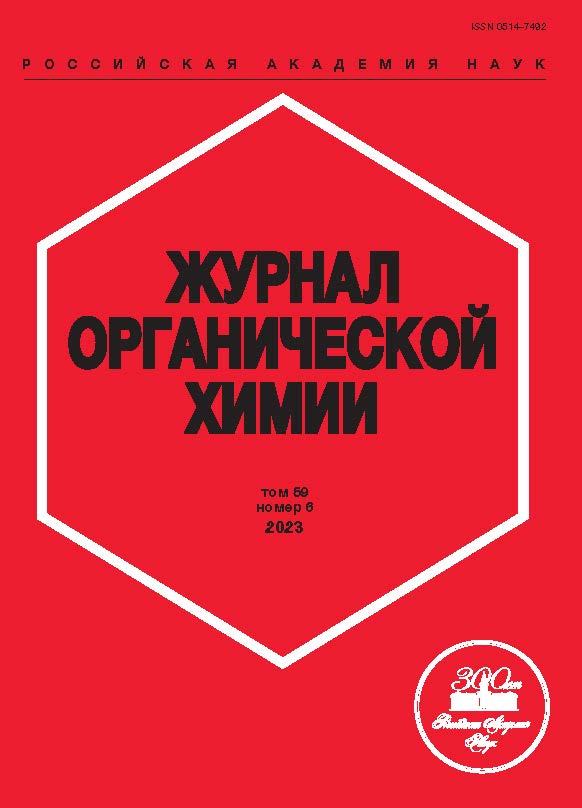Synergistic effects of cyclic ketals in fuel compositions and antibactrial agents
- Autores: Vol'eva V.B1, Ovsyannikova M.N1, Pokholok T.V1, Ryzhakova A.V1
-
Afiliações:
- N.M. Emanuel Institute of Biochemical Physics of Russian Academy of Sciences
- Edição: Volume 59, Nº 6 (2023)
- Páginas: 819-823
- Seção: Articles
- URL: https://rjmseer.com/0514-7492/article/view/666261
- DOI: https://doi.org/10.31857/S0514749223060125
- EDN: https://elibrary.ru/FBVJWR
- ID: 666261
Citar
Texto integral
Resumo
The synergistic effect of cyclic ketals in compositions with lower alcohols was first discovered in the study of the octane-raising effect of ketals additives to alcohol-containing gasolines. The use of model oxidation reactions of ketals and their structural analogs, benzdioxolanes, in proton-donor media made it possible to associate the mechanism of the synergistic effect with the formation of ketal-alcohol complexes with the properties of surfactants that form hydrated supramolecular structures around them. Inside them, more efficiently than in a bulk medium, hot fuel radicals are deactivated with a transfer from an explosive combustion mode to a stationary one. Such a structuring effect is of general importance for the functioning of ketals in hydrophobic-hydrophilic systems, including biological media. This conclusion is confirmed by the study of cyclic ketals activity in compositions with alcohols and carboxylic acids as antibacterial agents.
Sobre autores
V. Vol'eva
N.M. Emanuel Institute of Biochemical Physics of Russian Academy of Sciences
Email: violetta.voleva@gmail.com
M. Ovsyannikova
N.M. Emanuel Institute of Biochemical Physics of Russian Academy of Sciences
T. Pokholok
N.M. Emanuel Institute of Biochemical Physics of Russian Academy of Sciences
A. Ryzhakova
N.M. Emanuel Institute of Biochemical Physics of Russian Academy of Sciences
Bibliografia
- Fraatz K., Mertin D., Heep I. Пат. 1608335 (2007). ЕР.
- Варфоломеев С.Д., Никифоров Г.А., Вольева В.Б., Макаров Г.Г. Трусов Л.И. Пат. 2365617 (2009). РФ.
- Вольева В.Б., Белостоцкая И.С., Комиссарова Н.Л., Малкова А.В., Похолок Т.В., Давыдов Е.Я. ЖОрХ. 2013, 49, 458-461.
- Vol'eva V.B., Belostotskaya I.S., Komissarova N.L., Malkova A.V., Pokholok T.V., Davydov E.Y. Russ. J. Org. Chem. 2013, 49, 446-449. doi: 10.1134/S1070428013030226
- Варфоломеев С.Д., Вольева В.Б., Комиссарова Н.Л., Курковская Л.Н., Малкова А.В., Овсянникова М.Н., Гумеров Ф.М., Усманов Р.А. Изв. АН. Сер. хим. 2019, 68, 717-724.
- Varfolomeev S.D., Vol'eva V.B., Komissarova N.L., Kurkovskaya L.N., Malkova A.V., Ovsyannikova M.N., Gumerov F.M., Usmanov R.A. Russ. Chem. Bull. 2019, 68, 717-724. doi: 10.1007/s11172-019-2478-3
- Вольева В.Б., Овсянникова М.Н., Комиссарова Н.Л., Рыжакова А.В. ЖОрХ. 2021, 57, 188-193.
- Vol'eva V.B., Ovsyannikova M.N., Ryzhakova A.V. Russ. J. Org. Chem. 2021, 57, 160-164. doi: 10.31857/S051474922102004X
- Вольева В.Б., Овсянникова М.Н., Белостоцкая И.С., Комиссарова Н.Л., Малкова А.В. Хим.-фарм. ж. 2016, 50, 29-32.
- Vol'eva V.B., Ovsyannikova M.N., Belostotskaya I.S., Komissarova N.L., Malkova A.V. Pharm. Chem. J. 2016, 50, 306-309. doi: 10.30906/0023-1134-2016-50-5-29-32
- Овсянникова М.Н., Вольева В.Б., Белостоцкая И.С., Комиссарова Н.Л., Малкова А.В., Курковская Л.Н. Хим.-фарм. ж. 2013, 47, 18-21.
- Ovsyannikova M.N., Vol'eva V.B., Belostotskaya I.S., Komissarova N.L., Malkova A.V., Kurkovskaya L.N. Pharm. Chem. J. 2013, 47, 142-145. doi: 10.1007/s11094-013-0913-6
- Vol'eva V.B., Komissarova N.L., Ovsyannikova M.N., Domnina N.S., Malkova A.V. Antioxidants in Systems of Varying. Complexity Chemical, Biochemical, and Biological Aspects. Eds. L.N. Shishkina, A.N. Goloshchapov, L.I. Weisfeld. Toronto: Apple Academic Press Inc. 2020, 3-40.
- Константинова Н.Д., Диденко Л.В., Шустрова Н.М., Вольева В.Б., Белостоцкая И.С., Комиссарова Н.Л. Сборник тезисов "ХХ Российской Конференции по электронной микроскопии". Черноголовка. 2004, 236.
Arquivos suplementares










